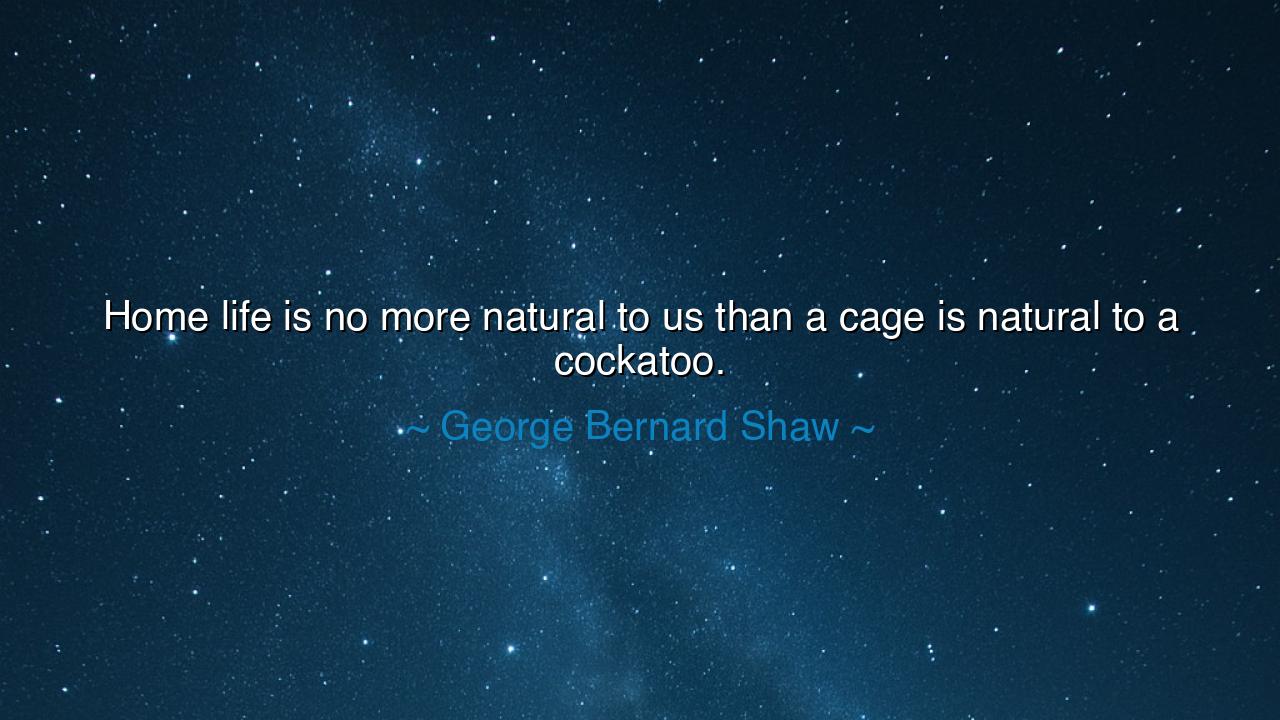
Home life is no more natural to us than a cage is natural to a






When George Bernard Shaw wrote, “Home life is no more natural to us than a cage is natural to a cockatoo,” he was not scorning the home, but challenging the illusion that domestic comfort alone can satisfy the restless spirit of humanity. His words are sharp, yes — yet beneath their sting lies a cry for freedom, for authenticity, for the courage to live beyond the bars of custom and expectation. Shaw, that fiery prophet of the modern age, saw how men and women often shrink their souls to fit the walls around them, trading the vast sky of possibility for the safety of routine. His metaphor of the caged cockatoo is not merely poetic; it is a mirror held before every human heart that has ever longed to fly while fearing the open air.
The origin of this quote can be found in Shaw’s lifelong rebellion against conformity and complacency. A playwright and philosopher of the early twentieth century, he looked upon society with both affection and scorn. He saw how the industrial age had confined the spirit of man — how the promise of security had become a new kind of bondage. To Shaw, the home, that sacred symbol of stability and peace, had too often become a prison for the mind and soul. Men became slaves to habit; women were bound by duty and expectation. The walls that were meant to shelter became walls that suffocated. And so he wrote these words as a warning: that comfort, if mistaken for purpose, will steal from us the wings we were born to use.
The meaning of Shaw’s words cuts to the heart of the human condition. We are creatures of paradox — yearning for safety yet born for freedom. The home, with its order, its rhythm, and its predictability, satisfies our need for belonging; yet beyond its walls lies the greater call of growth, of creation, of risk. The cockatoo in its cage may be fed and safe, but it cannot sing the true song of its kind until it feels the wind beneath its wings. Likewise, a human life confined entirely to domestic ease — to patterns unbroken, to comforts unchallenged — begins to lose its vitality. The fire of discovery dims, the mind grows dull, and the soul forgets that it was made for flight. Shaw’s wisdom reminds us that to live fully, one must step beyond the known and taste the wild air of the unknown.
Throughout history, the greatest souls have understood this truth. Consider Leonardo da Vinci, who could never stay long within any single discipline or dwelling. Painter, inventor, anatomist, dreamer — he belonged to no single home, no fixed path. His restlessness was not a flaw, but a mark of divine curiosity. Like the cockatoo longing for the open sky, Leonardo’s genius found life in movement, in exploration, in the refusal to be caged by convention. His life was proof that while the home may nurture the body, it is freedom that nourishes the spirit. And in this, Shaw’s metaphor finds its fulfillment: we must build homes not to imprison, but to launch us — not to restrain life, but to prepare us for flight.
Yet Shaw’s insight does not condemn the home itself. Rather, he warns against turning it into an idol. The home is a necessary sanctuary, but it must not become a fortress that seals us away from the challenges that make us grow. The wise know that the hearth and the horizon are companions, not enemies. There must be a rhythm between retreat and adventure, rest and striving. The home should restore our strength so that we may go forth again; it should be the nest from which we take flight, not the cage in which we forget the sky.
Even in our modern age, Shaw’s words echo with power. Many today live surrounded by comfort — glowing screens, soft couches, endless entertainment — yet their souls are restless. They mistake pleasure for peace, safety for fulfillment. They are like the cockatoo that sings behind bars, not realizing that its song is meant for the open world. Shaw calls to them still: break free from the invisible cages — from fear, from conformity, from the illusion that stability alone is life’s purpose. True living begins at the edge of comfort, where the known ends and the heart dares to expand.
So take this lesson, O seeker of meaning: love your home, but do not worship it. Build it with tenderness, rest within it with gratitude — but remember that it exists so that you may go forth into the world with renewed strength. Keep your wings unshackled, your mind curious, your soul daring. For as George Bernard Shaw reminds us, the home is not the sky; it is but the perch from which you must one day take flight. To live as a caged bird may feel safe — but to soar, even once, beneath the boundless heavens, is to taste the very essence of what it means to be alive.






AAdministratorAdministrator
Welcome, honored guests. Please leave a comment, we will respond soon